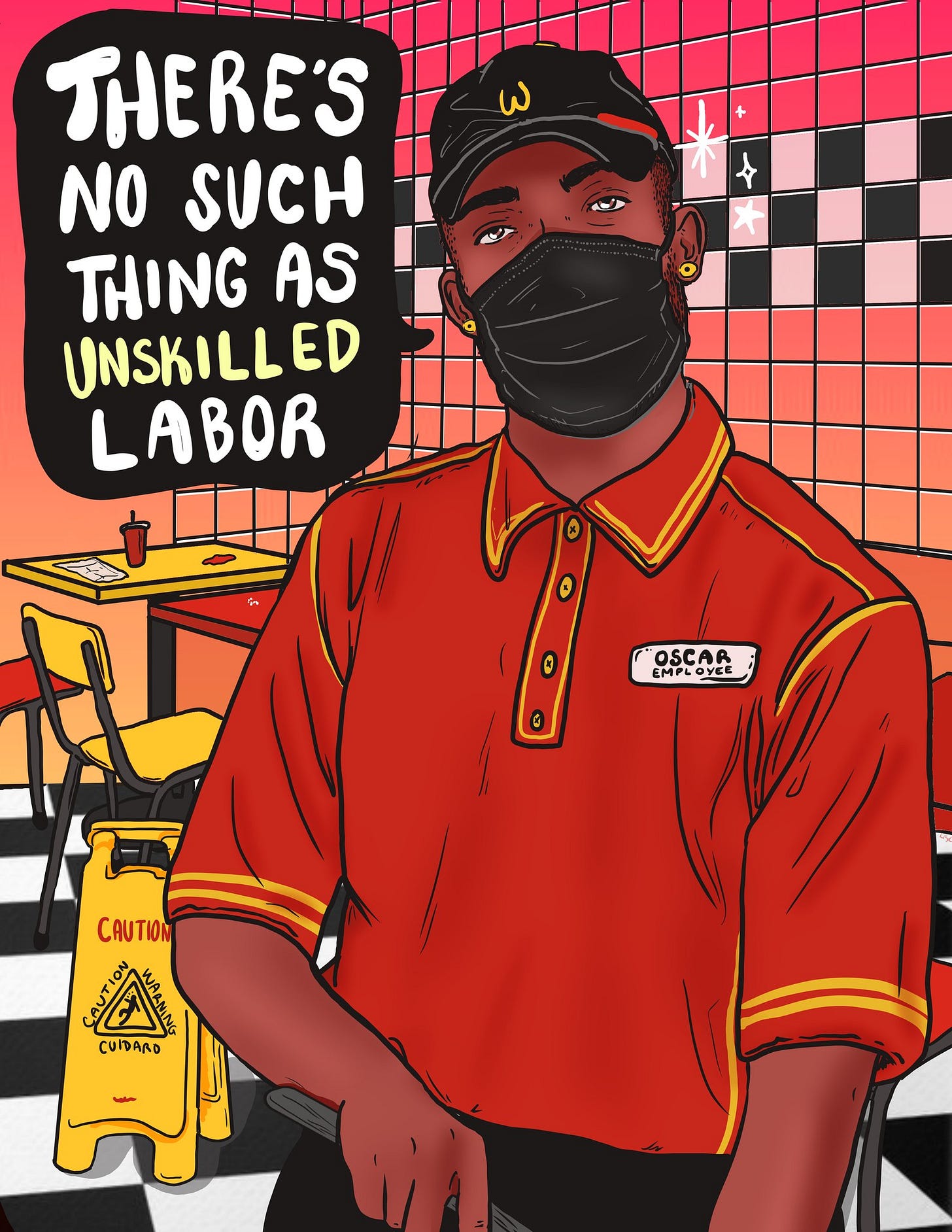What about Mamma's Labor?
Exploring the Hidden Labor and Agency in Women's Reproductive Work and What it Might Mean for All Workers
“I just did my cabinets,” says a lawyer to a colleague at his firm. “Funny enough, I just did my bathroom!,” replies the other. Except neither of these lawyers did more than schedule the job, impatiently wait for its completion, and pay the bill. And though the construction of the previous sentence is ordinary, it admits the lawyers didn’t do the work of installing cabinets or redoing a bathroom without indicating who did.
Everyday language allows us to speak about work “being done” without identifying and therefore crediting those who do such work. It's as though we are talking about forces of nature rather than human projects. Our linguistic habits often credit those who pay for labor rather than the laborers themselves. These tendencies reflect overlooked, common sense value judgments about whose work deserves recognition.
Our culture systematically denies reliance on certain kinds of laborers. Australian philosopher Val Plumwood called this conceptual practice “denied dependency” or simply “backgrounding.” Plumwood was particularly concerned with the way in which human beings denied their dependency on not only marginalized people’s labor, but also the natural environments upon which our very survival rests.1
Backgrounding is the tendency to treat the vital or essential as incidental or unworthy of recognition, particularly when the object of backgrounding is used to prop up another individual or group's entitlement or self-importance. A simple example of backgrounding would be the owner of a profitable company who thanks workers out of one side of their mouth and then insists they tolerate low wages and express gratitude for having a job out of the other side; all without any acknowledgment that their riches are utterly dependent upon the laborers’ work. But denied dependency is not specific to commerce and industry.
There is perhaps no labor so successfully invisibilized in our culture as reproductive labor. I have never been pregnant nor birthed a child. I have been privileged, however, to be present for the births of my children. If you pay close attention you may notice something is missing from the preceding sentence. Sure, I was present for “the births” of my children, but who birthed them? Are the children birthing themselves? A society that solely celebrates children on their birthday, and not the woman responsible for generating and then birthing the child, does not ask such questions. We are inured to a widespread cultural denial of our dependency on maternal labor.
In dominant United States’ culture, women are said to “have” babies. This is the way we speak of having our oil changed. We talk this way about our oil changes because most of us don’t do anything but drive the car to the shop and wait for the mechanics to do the actual work. And we have the good manners not to speak as though we’ve done more than scroll on our phones or watch cringe-worthy TV in the waiting room until the job is done. We just “have our oil changed.” (If the earlier examples regarding cabinets and bathrooms are true, we’ll have to admit many of us don’t practice these good manners as often as we should.)
Do we really think it’s accurate or appropriate to speak of those giving birth the way we speak of ourselves having our oil changed? Childbirth is, after all, the culminating act of creating a human being; an act of creativity so culturally significant that it has and continues to lead worshipers to their knees in praise of a divine being abstractly credited with the creation of the human species? An act of creation that, funded by millions and millions of dollars, finds award-winning scientists and technologists devoting themselves to replicating it in laboratories?
Can you imagine someone saying something like “Kansas City had a Super Bowl victory in 2024” leaving out the agents responsible for that impressive achievement, or “The Kansas City Chiefs had a Super Bowl victory in 2024,” relegating the team to a passive recipient of the victory? Of course not. Yet ordinary language and representations of childbirth frequently diminish or leave out acknowledgment of women’s agency and labor.
Mama’s Belly: Maternal Agency in a Children's Book
Kate Hosford’s precious children’s book Mama's Belly exemplifies the unintentional marginalization of maternal agency so common in our culture. The book, beautifully illustrated by Abigail Halpin, is written from the point-of-view of a child processing a range of conflicting feelings about her mother’s pregnancy. She is excitedly awaiting the arrival of her sister, but also worrisome about how this new being will impact her life.
What is the result of significant maternal labor is spoken of as a foregone conclusion.
“Mamma has a belly rising up, like a wave. Inside is my sister, waiting to meet me. 'Hello' in there,' I say. 'When are you coming out?’”

The child’s sister is inside her mother and just waiting to “come out.” Later the daughter asks, “When my sister comes do I have to share my blanket?” The child fails to see birth as the mother’s labor. Instead she attributes agency to the baby who is responsible for “coming out.” Describing birth this way backgrounds if not altogether disappears women’s reproductive agency. Babies are left to be created by divinities and delivered by storks or doctors.
How else might we speak of birth to recognize maternal agency? I offer this modest revision:
“Inside is
my sister, waiting to meet mea seed of life my mama is making into my sister.”
On another page the child addresses her mama’s belly directly saying, “Hello in there, I say. When are you coming out?” This is the innocent and uninformed perspective of a child. Anyone who believes in critical dialogue understands that this is an opportunity for critical engagement. Thus, we might imagine a response like this:
“Mama laughs and says, ‘I’m not done making her, yet. And when I’m done, my body decides when it’s time for her to go out.’”
Later in the touching story the author writes, “Mama finds a picture of me, one day old. I’m looking right into her eyes.” I imagine that the child in a revised version may have learned from mama’s gentle correction, above, and say something like this:
“Soon I will look right into my sister’s eyes and say, ‘Welcome to the world. Our mama made you, and I'm here to love you.’”
Near the end of the book we read, “When my sister comes out, will you have enough love for both of us?” We can restore the pregnant woman’s agency with a minor edit like this: “When my sister comes out you finish making my sister, will you have enough love for both of us?” It’s a small but significant change that recognizes the child’s mother as the creative laborer rather than passive recipient—“haver”—of her (future) sister.
Crediting Laborers for their Work
Ideally, shifting our thinking and communication in the ways suggested above would help us recognize women's birth-work the way that Canadian artist, Amanda Greavette portrays it in her artistic treatment of pregnancy and childbirth. Greavette’s painting “Rushing Waters” portrait of a woman’s water birth, leaves no question as to who is responsible for generating new life. The woman is not the recipient of a baby. Her active and dynamic toil—a toil that began months before her birth day—is the productive force responsible for making the baby’s life possible.

The discrediting of women's reproductive agency has a long and storied history. Many a spiritual-mythic tradition has claimed man as the ontologically original human being, with the unambiguous implication being that women came after if not directly from man. Learning to overcome our acculturated obliviousness to women's reproductive labor in forging embryos to babies may help us become more alert to other forms of uncredited and invisibilized work.
From Women’s Reproductive Labor to Wider Recognition for All Workers
Many of the things and experiences we rely upon and enjoy in daily life do not simply happen. They result from people’s time-consuming efforts. These efforts, let us never forget, are done by mortal beings. Our time spent working is unrecoverable, taken from a limited wellspring of life. Workers inevitably give of themselves—their bodies and being—in producing the goods and services they share with us. May we be grateful for the fruits of this labor.
Some attempt to rationalize unfair compensation or flagrantly dehumanizing treatment of workers on grounds that some are “unskilled.” First, it’s not self-evident why the level of skill required to do a job ought to be the basis for determining how to treat or pay a person doing such work. Every hour of work for a mortal being is an equally significant existential investment of self. An hour of a lawyer’s life is the same length of a trash collector’s hour. Each hour comes from an equally limited storehouse of life.

Second, all jobs require the ability to complete a set of tasks. These are tasks consumers apparently want completed. If some person working at a fast-food chain, for example, completes those tasks we get the food we’ve sought out. Create a hierarchy of skill all you want, but whoever provides the goods or services we seek possesses abilities that satisfy our valued desire. And that ought to be enough to merit respect and appreciation.
Respecting laborers begins with combatting denied dependency. We can do this, for one, by not claiming to do the work others have done for us. We can borrow from academic culture in citing the sources of the labor we rely upon.2 We can also combat the backgrounding of labor by trying to think and speak about pregnant women in ways reflecting the reality that they are not mere “vessels” for preformed persons. Mothers don’t “have” babies. In a word, they make them.
By becoming more aware of the agency and work producing the goods and services—even human beings—we rely upon for sustenance and joy, we create a clearer moral picture about what workers are entitled to in relation to the fruits of their labor. This picture also helps us think more clearly about what decision-making power workers ought to exercise over their creative labor. We might appropriately honor the autonomy of laborers of all kinds in making choices about the conditions of their labor and when their entitled to terminate a given project.
Invite Dr. Nall to Speak
Dr. Nall delivers energetic live presentations and engaging workshops on the subjects featured in Humanities in Revolt. Those interested in booking a workshop or talk can get in touch through Facebook or by leaving a comment.
In her book Feminism and the Mastery of Nature (1993), Plumwood wrote, “Dominant western culture has systematically inferiorised, backgounded and denied dependency on the whole sphere of reproduction and subsistence.”









Excellent post, Jeffrey. I know what it is like to be a factory worker, a warehouse worker, a truck driver. I did all these jobs (and more) while working my way through engineering school. I remember how I was viewed. The owners and managers could care less about who I was. I was merely someone who had to produce.
It is the same with women in certain societies. They have to produce children and raise the next generation to do the same. I think it might relate to the verse in the biblical Book of Genesis to be "fruitful and multiply."
It is the same biblical book that says to "subdue the Earth." That humans ought to dominate the Earth, our Home This idea, in my view, is why we have this overarching idea that we must extract, exploit and produce. We hold no honour for the Earth. We hold no honour for other species We hold no honour for ourselves.
In other words, we do so with cynicism and contempt. What we need is a reversal of thought. We need to honour the Earth and have gratitude for what it provides us. It is the Earth that produces.
I love this essay Jeffery! Women have always had to struggle in all domains of life to take her agency back in this patriarchal world. However the saddest struggle of them all is the struggle to gain agency for her labour of birth. The backgrounding of women in many cultures is deep and perpetual. And so is for the people who toil hours to create a functional society for those of us who conveniently make them obsolete in our language. This is s thought provoking essay. Thank you for sharing this.